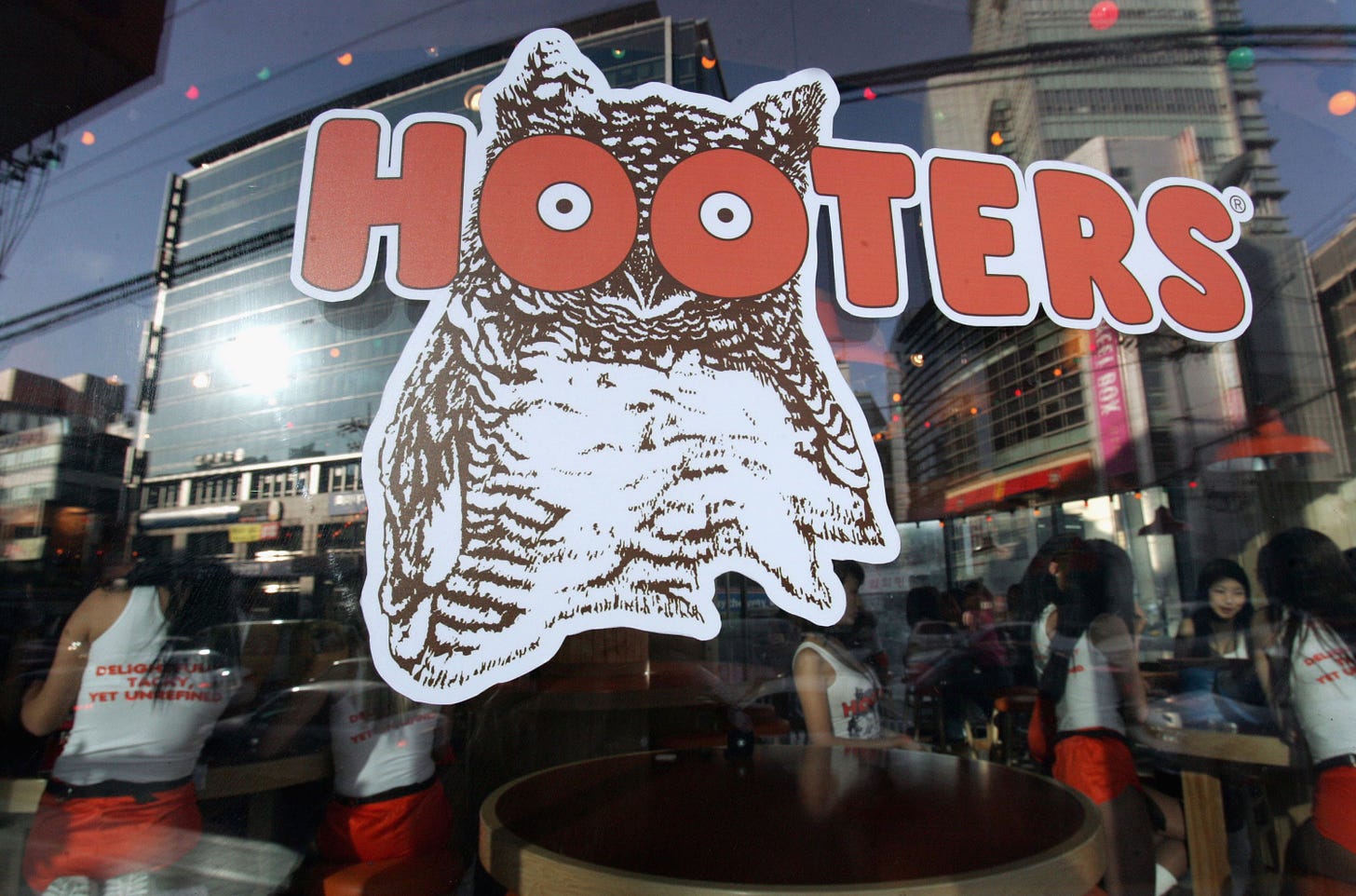When I was in college, I had a few friends on the dance squad for the city’s arena football team. They had practices almost every day of the week, attended frequent promotional events at bars to represent the team, and sold posters of themselves at tailgate parties. They signed merchandise and flirted, handed out drinks and smiled.
For all this, they got paid...nothing. Being desired by men was supposed to be reward enough.
I thought about those friends when I saw the controversy over the new Hooters uniforms—tiny shorts that are closer to underwear than actual clothing. Waitresses for the restaurant chain started complaining en masse about the shorts on social media, so much so that the company was forced to make the attire optional.
But before Hooters reversed its decision, men were downright furious that the women who worked for the restaurant would dare oppose the uniform. (Not linking because fuck ‘em)
If you don’t like the idea of selling your body, don’t work for Hooters.
What did you expect?
Then don’t work at Hooters dumb bitch!
Quit whining. You should be naked when you serve me chicken.
Apparently women lose all rights as workers (and people!) once they show a bit of skin. That’s the thing about misogyny: It tells women to present themselves in a way that men find arousing, but looks down on them when they do.
There is no winning this game. If you don’t adhere to sexist beauty standards, you’re sneered at as ugly and worthless; if you go along with them, you’re an attention-seeking slut.
The more nuanced bit, though, is that women aren’t just expected to look desirable to men—we’re supposed to enjoy that desire more than anything. More than our comfort, more than our safety, more than our ability to make a living. So when a woman disrupts that fantasy (say, by complaining about a uniform at an already-sexualized workplace) men become livid.
Sexists don’t want to be reminded that women aren’t working at Hooters because they like wing-stained drunks leering at them, but because it’s a job.
It’s the same reason men get angry when women rebuff their catcalls or don’t take sexual harassment as a ‘compliment’—we’re not just rejecting them, but the rule that says male attention is invaluable.
They’re mad at us for breaking a social contract that we never agreed to in the first place.
Now, it’s true that male attention and desire can be currency in a sexist world. And if you don’t have political or financial power, it’s not unreasonable to capitalize on whatever access to power you do have. (But that doesn’t mean that men still won’t hate you for it.)
The truth is that misogynists need to live in a make-believe world where women enjoy any and all attention, are thrilled to wear shorts that ride up their ass, and only need to be paid in lewd compliments. Because the truth—that male attention is easily obtained, abundant, and largely worthless—is a little too much reality to bear.





I’m here to tell you that it’s posts like this that save my sanity and life. Living here in Long Island, with the kind of men I’m surrounded by in my family (alas of a certain generation, but I’m beginning to confidently doubt that it’s simply generational) and having them constantly ask me “why are you so bitter” when I express myself similarly, your posts recalibrate me and remind me that I’m not alone. I’m not bitter! And even if I was bitter, there’s a place for bitterness. I’m not required to be sweet all the time. I will not be browbeaten into being sweet, or fearing being perceived as bitter (which is the antithesis of ideal femininity, as we know). All the tastes serve a purpose — look at ayurvedic meals: they’re all there, sweet, sour, salty, pungent, bitter, and astringent. Thank you, thank you, thank you, for all the flavors.
Earlier today, some jackass chastised me extensively for talking about the "wrong" things on my law firm's blog. The rationale: "as the face of a law firm" you [must not use colloquial language, must not talk about feelings, must not criticize men who are having fun, must not suggest you're an expert despite the apparent fact that you are, blah, blah.]" The "face" bit alerted me to a barely concealed expectation that his feelings about my symmetrical face (attraction?) should match his feelings about my opinions (revulsion?). Your words were precisely what I needed to read. THANK YOU.